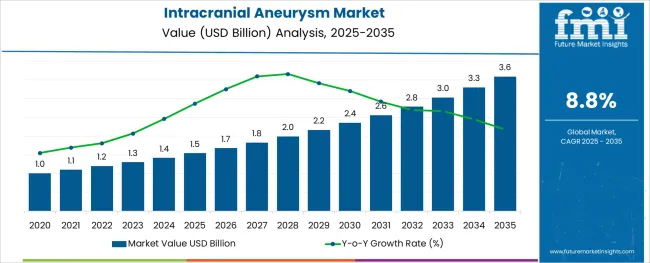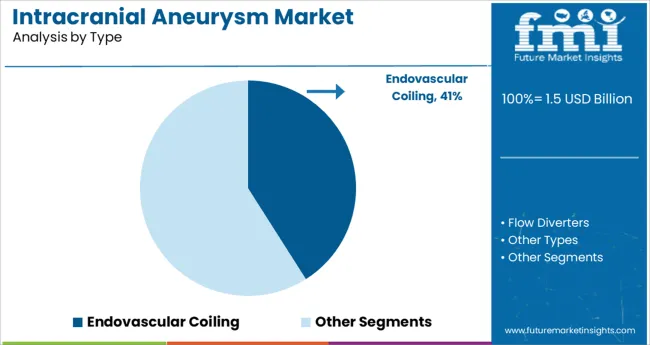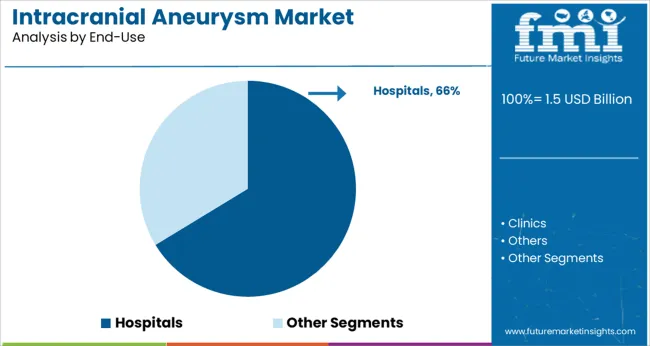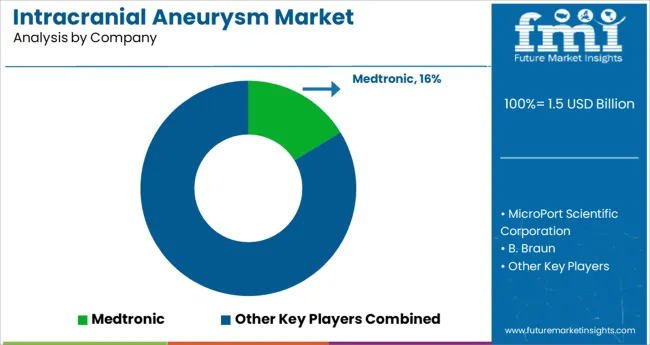The Intracranial Aneurysm Market is estimated to be valued at USD 1.5 billion in 2025 and is projected to reach USD 3.6 billion by 2035, registering a compound annual growth rate (CAGR) of 8.8% over the forecast period.

The intracranial aneurysm market is advancing steadily due to increasing awareness, improved diagnostic imaging, and broader access to neurovascular care. Rising incidence of unruptured aneurysms, especially among aging populations and hypertensive patients, is pushing early detection and elective treatment interventions. Innovations in neurointerventional devices such as detachable coils, flow diverters, and intrasaccular implants are transforming treatment modalities toward minimally invasive options.
Hospitals and specialized centers are adopting advanced catheter-based technologies with enhanced safety profiles, shorter recovery times, and reduced hospitalization costs. With strong support from neurology societies and ongoing physician training initiatives, the market is witnessing heightened procedure volumes.
Additionally, clinical trials and FDA approvals of next-generation embolic and stent systems are paving the way for more effective outcomes. As reimbursement frameworks evolve and treatment accessibility improves in emerging economies, the market is poised for continued adoption of minimally invasive, device-based therapies across primary and tertiary healthcare settings.
The market is segmented by Type and End-Use and region. By Type, the market is divided into Endovascular Coiling, Flow Diverters, Other Types, and Surgical Clipping. In terms of End-Use, the market is classified into Hospitals, Clinics, and Others. Regionally, the market is classified into North America, Latin America, Western Europe, Eastern Europe, Balkan & Baltic Countries, Russia & Belarus, Central Asia, East Asia, South Asia & Pacific, and the Middle East & Africa.
The market is segmented by Type and End-Use and region. By Type, the market is divided into Endovascular Coiling, Flow Diverters, Other Types, and Surgical Clipping. In terms of End-Use, the market is classified into Hospitals, Clinics, and Others. Regionally, the market is classified into North America, Latin America, Western Europe, Eastern Europe, Balkan & Baltic Countries, Russia & Belarus, Central Asia, East Asia, South Asia & Pacific, and the Middle East & Africa.

Endovascular coiling is projected to hold 41.0% of the total revenue share in 2025, making it the leading treatment type within the intracranial aneurysm market. This dominance is attributed to its minimally invasive nature, lower perioperative risk, and growing preference among neurointerventionists for treating both ruptured and unruptured aneurysms.
The technique allows for targeted occlusion of the aneurysm sac, with newer coil designs offering improved packing density and reduced recurrence rates. Continuous improvements in microcatheters, coil delivery systems, and adjunctive devices like balloon and stent-assisted coiling have expanded its suitability across complex aneurysm anatomies.
Hospitals and stroke centers have scaled infrastructure to support endovascular procedures, which has reinforced procedural volume growth. As long-term data supports its safety and efficacy, endovascular coiling remains the standard of care in many developed markets and is gaining momentum in emerging regions through technology transfer and physician training.

Hospitals are anticipated to account for 66.3% of total revenue in 2025, representing the dominant end-use segment in the intracranial aneurysm market. This leadership is driven by the availability of advanced imaging systems, hybrid operating suites, and specialized neurovascular teams that enable comprehensive aneurysm management under one roof.
Tertiary and quaternary care hospitals are equipped with digital subtraction angiography labs, intensive care units, and post-procedural monitoring capabilities, making them the preferred destination for aneurysm treatment. Reimbursement alignment, institutional accreditation, and access to clinical trials further position hospitals as the hub for high-volume and complex aneurysm interventions.
Increasing investment in neurology infrastructure and rising collaborations with device manufacturers are enhancing procedural capabilities. The integration of real-time imaging, AI-based diagnostic support, and catheter-based treatment platforms has further cemented hospitals as the primary channel for delivering intracranial aneurysm care with high safety and outcome standards.
Rising high-blood pressure patients through trauma and blood vessels along with hypertension leading to the cases of an intracranial brain aneurysm are fueling the demand for intracranial aneurysm treatment and solutions.
According to the intracranial aneurysm market survey, the market is dynamic in nature and functions in every component. Currently, a large number of people are at risk of a brain aneurysm. The elderly class is more affected and exposed to the condition and seeks instant treatment solutions.
From medication to consultancy, the government is focusing more and more on intracranial aneurysm treatment as it grows among the population. Minimally invasive surgeries are also helping patients in getting relief, fueling the demand for intracranial aneurysm treatment solutions.
New technology and innovative techniques like endovascular coiling are being used for the treatment of intracranial aneurysms that are a part of minimally invasive procedures, widely recommended by physicians. In this procedure, a microcatheter is inserted in the groin area through the artery consisting of an aneurysm.
That checks upon the condition of the aneurysm and prevents the blood from entering other parts of the brain. This fuels the sales of intracranial aneurysm treatment solutions.
The spread of covid-19, high health risk chances during surgeries coupled with the high cost associated with treatment solutions are hindering the growth of the intracranial aneurysm market. As the covid-19 has stretched its roots and damaged the supply chains of multiple markets, especially with the government putting bans and logistics restrictions, capital generation went low while the expense got high with time, damaging multiple market spaces.
The intracranial aneurysm market was also got adversely affected by the curse of the pandemic as the healthcare centers were filled with the covid-19 patients, and research and development centers were inactive, especially those that research minimally invasive surgeries and their effects.
Another factor that hampered the growth of the intracranial aneurysm market is the risk associated with surgeries along with alternative medicine options that end user or patient considers less risky.
According to the intracranial aneurysm market analysis, the type category has three major segments, Surgical Clipping, Endovascular Coiling, and Flow Diverters. The endovascular coiling segment dominates the market while holding a market share of 85.3% of the global share.
The minimally invasive techniques go through the catheter to locate the aneurysm in the brain. Growing hypertension among the geriatric population leads people to a higher chance of brain aneurysms and other diseases, ultimately gaining traction for the intracranial aneurysm market. The neurology industry and the Intracranial Aneurysm solutions market grow side by side, thriving the demand for Intracranial aneurysms.
According to the intracranial aneurysm market research report, the end user category is dominated by the hospital segment, holding 89.5% of the global market. The segment grows at a promising CAGR of 8.9% through the forecast period.
The factors that attribute to the growth of the intracranial aneurysm market in this segment are the application of technologically advanced tools in operation theaters and intensive care units, the rising number of hospitals globally, and increased government funding to the hospitals. This fuels the sales of intracranial aneurysm treatment solutions.
North America holds 27% of the global share in the global intracranial aneurysm market in 2025.
The growing intracranial aneurysm market in the North American region is attributed to the growing healthcare facilities, government investments, and rising cases of brain aneurysms. Furthermore, the relevant cases of hypertension and intracranial aneurysms have increased the overall demand for intracranial aneurysm treatment solutions in new regions of North America.
Also, an increasing number of initiatives being undertaken by various organizations is expected to fuel market growth. The new research and development centers are focusing on new treatment approaches, such as the endovascular process.
Asia Pacific region is anticipated to thrive at the highest CAGR of 12.7% through 2035. Presence of emerging economies like India and China that are investing huge capital in building their healthcare infrastructure, advancing and making it tech-enabled.
The cases of hypertension and brain aneurysms rising with the geriatric population growing in the region are fueling the growth of the market. Other factors that gain traction for the intracranial aneurysm market are an increasing number of initiatives being undertaken by various organizations that are expected to fuel market growth.
The Intracranial aneurysm market size expands the new diseases, and the markets related to their treatment and cure are proliferating. Higher government investments and businesses are taking an interest in the specific healthcare support centers, along with the rising healthcare sector in almost every region, which is increasing the startup activity.
The non-profitable organization is also taking part in building these health centers. For instance, The Bee Foundation (TBF), an NGO, is focusing on spreading awareness and reducing the number of deaths due to cerebral aneurysms through innovative research.

The intracranial aneurysm market has various key competitors that focus on expanding healthcare centers with advanced technology. The key competitors understand and focus on new techniques that are aneurysm-specific and target wall healing and blood prevention.
This makes the competitive landscape more dynamic and versatile, owing to the expansion of the intracranial aneurysm market.
The key competitors flourishing in the growth of intracranial aneurysm treatment solutions are Medtronic, Microport Scientific Corporation, B. Braun, Stryker, Johnson and Johnson Services Inc., Microvention Inc., Codman Neuro (Integra Lifesciences).
Recent Developments in the Global Intracranial Aneurysm Market
The global intracranial aneurysm market is estimated to be valued at USD 1.5 billion in 2025.
It is projected to reach USD 3.6 billion by 2035.
The market is expected to grow at a 8.8% CAGR between 2025 and 2035.
The key product types are endovascular coiling, flow diverters, other types and surgical clipping.
hospitals segment is expected to dominate with a 66.3% industry share in 2025.






Our Research Products

The "Full Research Suite" delivers actionable market intel, deep dives on markets or technologies, so clients act faster, cut risk, and unlock growth.

The Leaderboard benchmarks and ranks top vendors, classifying them as Established Leaders, Leading Challengers, or Disruptors & Challengers.

Locates where complements amplify value and substitutes erode it, forecasting net impact by horizon

We deliver granular, decision-grade intel: market sizing, 5-year forecasts, pricing, adoption, usage, revenue, and operational KPIs—plus competitor tracking, regulation, and value chains—across 60 countries broadly.

Spot the shifts before they hit your P&L. We track inflection points, adoption curves, pricing moves, and ecosystem plays to show where demand is heading, why it is changing, and what to do next across high-growth markets and disruptive tech

Real-time reads of user behavior. We track shifting priorities, perceptions of today’s and next-gen services, and provider experience, then pace how fast tech moves from trial to adoption, blending buyer, consumer, and channel inputs with social signals (#WhySwitch, #UX).

Partner with our analyst team to build a custom report designed around your business priorities. From analysing market trends to assessing competitors or crafting bespoke datasets, we tailor insights to your needs.
Supplier Intelligence
Discovery & Profiling
Capacity & Footprint
Performance & Risk
Compliance & Governance
Commercial Readiness
Who Supplies Whom
Scorecards & Shortlists
Playbooks & Docs
Category Intelligence
Definition & Scope
Demand & Use Cases
Cost Drivers
Market Structure
Supply Chain Map
Trade & Policy
Operating Norms
Deliverables
Buyer Intelligence
Account Basics
Spend & Scope
Procurement Model
Vendor Requirements
Terms & Policies
Entry Strategy
Pain Points & Triggers
Outputs
Pricing Analysis
Benchmarks
Trends
Should-Cost
Indexation
Landed Cost
Commercial Terms
Deliverables
Brand Analysis
Positioning & Value Prop
Share & Presence
Customer Evidence
Go-to-Market
Digital & Reputation
Compliance & Trust
KPIs & Gaps
Outputs
Full Research Suite comprises of:
Market outlook & trends analysis
Interviews & case studies
Strategic recommendations
Vendor profiles & capabilities analysis
5-year forecasts
8 regions and 60+ country-level data splits
Market segment data splits
12 months of continuous data updates
DELIVERED AS:
PDF EXCEL ONLINE
Cerebral Aneurysm Management Market Insights – Trends & Forecast 2025 to 2035
Endovascular Aneurysm Repair (EVAR) Market Size and Share Forecast Outlook 2025 to 2035
Thoracic Aortic Aneurysm Market Size and Share Forecast Outlook 2025 to 2035
Abdominal Aortic Aneurysm Treatment Market Analysis – Size, Share & Forecast 2025 to 2035

Thank you!
You will receive an email from our Business Development Manager. Please be sure to check your SPAM/JUNK folder too.
Chat With
MaRIA